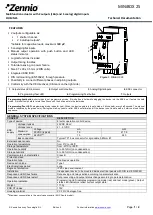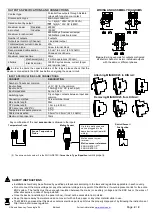
© Zennio Avance y Tecnología S.L. Edition 4 Further information
Page.
2
/
2
Zennio Temperature
Probe
Up to two motion sensors
can be plugged into the
same device input (parallel
wiring)
Motion sensor screw
terminal.
Motion sensor references:
ZN1IO-DETEC-P
(2)
ZN1IO-DETEC-X
Temperature Probe
Motion Sensor
Switch/Sensor/
Push button
Removing MINiBOX 25 from DIN rail:
(2) The micro switch number 2 in the ZN1IO-DETEC-P
must be in Type B position
to
work properly.
Attaching MINiBOX 25 to DIN rail:
Any combination of the next
accessories
is allowed in the inputs:
WIRING AND ASSEMBLY DIAGRAMS
Figure 2
: wiring example for outputs configured
as shutter channel or as two individual outputs
with the same or different phases
OUTPUTS SPECIFICATIONS AND CONNECTIONS
Contact type
Potential free outputs through bistable
relays with tungsten pre-contact.
Disconnection type
Micro-disconnection
Rated current by output
16(6)A * 250V AC (4000 VA)
16(6)A * 30V DC (480W)
Maximum power
per output
Resistive
4000W
Inductive
1500W
Maximum inrush current
800A/200
μ
s (fluorescent lamps)
165A/20ms (resistive lamps)
Number of outputs
2 outputs
Outputs per common (Channel)
1 individual output
Total maximum current in device
20A
Connection type
Screw terminal block
Recommended cable section
0,5 mm² to 4 mm² (20-12 AWG)
Cable type
Stranded or solid wire.
Maximum response time
50ms
Lifetime
Mechanical (min)
3 million operations (60cpm)
Electrical (min.)
100.000 cycles at max. current (6cpm
and resistive load)
INPUT SPECIFICATIONS AND CONNECTIONS
CONCEPT
DESCRIPTION
Number of inputs per common
5
Input voltage
+3.3V DC for the common
Input current
1.0mA @ 3.3V DC (each input)
Input impedance
Aprox. 3.3kΩ
Switching type
Dry voltage contacts between input and
common
Connection method
Screw terminal block
Max. cable length
30m
NTC probe length
1.5m (up to 30m)
NTC accuracy (@ 25ºC)
0.5ºC
Temperature measure precision
0.1ºC
Cable cross-section
0.5mm² to 2.5mm² (24-12 AWG)
Maximum response time
10ms
SAFETY INSTRUCTIONS
•
Installation should only be performed by qualified professionals according to the laws and regulations applicable in each country.
•
Do not connect the mains voltage nor any other external voltage to any point of the KNX bus; it would represent a risk for the entire
KNX system. The facility must have enough insulation between the mains (or auxiliary) voltage and the KNX bus or the wires of
other accessories, in case of being installed.
•
Once the device is installed (in the panel or box), it must not be accessible from outside.
•
Keep the device away from water and do not cover it with clothes, paper or any other material while in use.
•
The WEEE logo means that this device contains electronic parts and it must be properly disposed of by following the instructions at
http://zennio.com/weee-regulation.
⚠
In order to ensure the expected status of the relays, please check that the
device is connected to the KNX bus before energizing the power circuit.




















